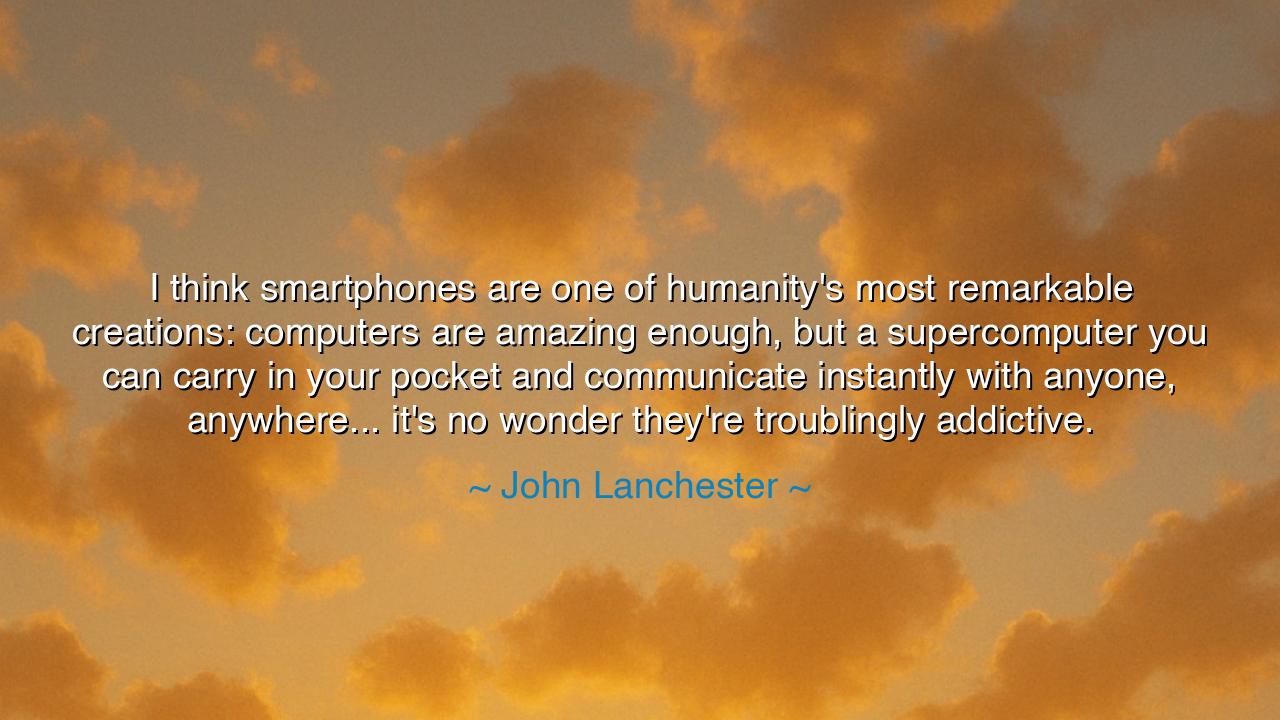
I think smartphones are one of humanity's most remarkable
I think smartphones are one of humanity's most remarkable creations: computers are amazing enough, but a supercomputer you can carry in your pocket and communicate instantly with anyone, anywhere... it's no wonder they're troublingly addictive.






In the grand unfolding of human progress, few creations have been as transformative as the smartphone—an object that, in its seemingly humble form, holds the essence of all that has come before it. John Lanchester, in his profound reflection, declares, “I think smartphones are one of humanity’s most remarkable creations: computers are amazing enough, but a supercomputer you can carry in your pocket and communicate instantly with anyone, anywhere... it’s no wonder they’re troublingly addictive.” These words, spoken with a sense of awe and recognition, speak to a truth that resonates deeply with the modern age: we live in an era where the unimaginable has become the everyday, where the boundaries of what we once believed possible have dissolved, and with it, our understanding of the human experience itself.
The smartphone is, in many ways, a marvel of human ingenuity—an extension of the very mind, a device that allows us to reach beyond the limits of our physical selves and touch the corners of the world. It is not simply a computer but a supercomputer, capable of processing data at speeds once unimaginable, connecting us to the vast reservoir of human knowledge. Yet, even as we marvel at this tool of progress, we must also reckon with the power it holds over us. Just as the ancient Greek myths told of gods and artifacts that bestowed great power but came with profound consequences, so too does the smartphone. It offers us the world, but it also captures our attention, often in ways that feel unnatural and all-consuming.
Consider the story of Prometheus, who stole fire from the gods and gave it to humanity. Fire, a force of great power, illuminated the world and brought warmth, but it also held the potential for destruction. Prometheus’ gift was both a blessing and a curse, and in much the same way, the smartphone serves as both a boon and a burden. It allows us to connect with others across the globe, to access knowledge, and to create in ways we never thought possible. But like fire, it demands our attention and can, if left unchecked, burn us in ways we don’t always understand. We become addicted, as Lanchester suggests, not because the technology is inherently flawed, but because we, like the ancient Greeks, have failed to balance its power with wisdom.
The tale of Alexander the Great provides another lens through which to view this complex relationship with power. Alexander, a man of immense vision, sought to conquer and unite the known world. He had at his disposal the tools of his time—an army, strategies, and immense willpower. Yet, his conquests were often driven by an insatiable desire to expand, to consume, to control. In much the same way, the smartphone offers us the ability to connect, but also the temptation to overconsume—whether through social media, constant notifications, or the sheer volume of information at our fingertips. Like Alexander, we must learn not to be enslaved by the tools we wield, but to wield them with purpose, discretion, and awareness.
As with all great gifts, the smartphone carries with it both promise and peril. The addiction it fosters is not simply one of the body, but of the mind and soul. We find ourselves tethered not to the people before us, but to the virtual world that seems to pulse with endless possibilities, all of them competing for our attention. Yet, the very power that the smartphone offers can be harnessed in ways that nourish the spirit. If we choose to use it to connect meaningfully, to learn, and to create, then it becomes a tool for growth. If we surrender to it, however, it may consume us, leaving us adrift in a sea of distraction and shallowness.
In this, Lanchester’s quote reminds us of the need for balance. Just as the great minds of the past understood that the tools we create must serve us, we must apply the same wisdom to our relationship with modern technology. We must learn to use the smartphone not as an extension of our addictions, but as an extension of our consciousness—a tool for creativity, growth, and connection, not a force that overwhelms us. To do so requires a deliberate choice, an active commitment to mindfulness in how we use these tools, knowing when to engage with them and when to disconnect.
The true lesson of Lanchester’s words is one of awareness and control. The smartphone is not an enemy, nor is it inherently harmful. It is a gift, one that demands of us a new kind of discipline—one that recognizes the power of the device while remaining grounded in our humanity. Let us use these tools to elevate our lives, to connect with the world in ways that serve the greater good, and to avoid the trap of overconsumption that diminishes our capacity for presence, reflection, and meaningful engagement with the world around us. In this way, we can harness the incredible power of technology without losing ourselves in its grip.






AAdministratorAdministrator
Welcome, honored guests. Please leave a comment, we will respond soon